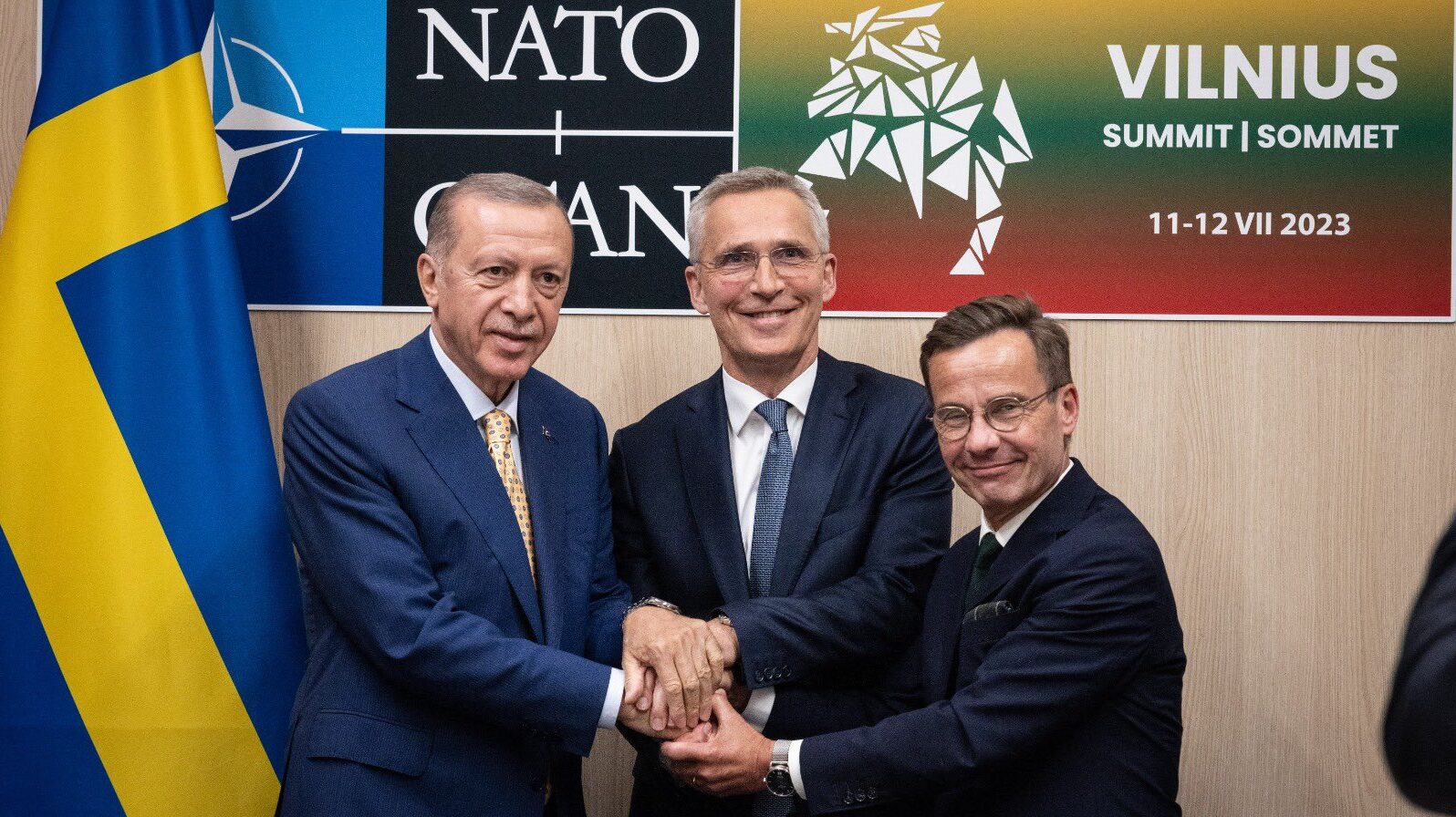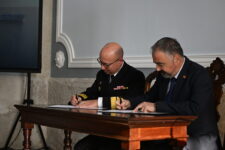
President Recep Tayyip Erdoǧan of Türkiye, Prime Minister Ulf Kristersson of Sweden, and NATO Secretary General Jens Stoltenberg reached agreement on Sweden’s ability to join NATO on July 10, 2023. (NATO Twitter)
VILNIUS and WASHINGTON — Less than a day after Sweden’s hopes for joining NATO appeared on thin ice, Turkish president Recep Tayyip Erdogan has agreed to allow Stockholm’s alliance membership request to move forward, NATO chief Jens Stoltenberg said today.
While far from the official last step for Sweden’s NATO ascendancy, the transmission of Sweden’s Accession Protocol to the Turkish Grand National Assembly all but removes any doubt that the northern European nation will become the alliance’s 32nd member.
“I’m glad to announce that as a result [of discussions between Turkey and Sweden] President Erdogan has agreed to forward the Accession Protocol for Sweden to the Grand National Assembly as soon as possible and work closely with assembly to ensure ratification,” Stoltenberg told press in a quickly announced late evening press conference. “We have been able to reconcile the concerns that Turkey has expressed with the concerns that Sweden has.”
The turnaround came following a meeting between Erdogan, Stoltenberg and Prime Minister Ulf Kristersson of Sweden on the edges of the Vilnius Summit, which will see the leaders of the NATO nations gather in Lithuania. It comes just hours after Erdogan stated that he was now linking Sweden’s alliance membership with Turkey’s ability to join the European Union, in a move that appeared to start the summit off on a sour note.
Instead, Stoltenberg, US President Joe Biden and other world leaders who have been pressuring Erdogan, get a big win to start the meeting. In a statement, Biden said he “welcomed” the move, adding, “I stand ready to work with President Erdoğan and Türkiye on enhancing defense and deterrence in the Euro-Atlantic area. I look forward to welcoming Prime Minister Kristersson and Sweden as our 32nd NATO Ally. And I thank Secretary General Stoltenberg for his steadfast leadership.”
For his part, Erdogan gets to repair some of the relationships with the West that had frayed during his nationalistic presidential campaign, while extracting concessions from Sweden on dealing with Kurdish groups Turkey considers terrorists.
In addition, Sweden “has agreed to support actively the efforts to reinvigorate Turkey’s EU accession process, and also to help to modernize the EU Turkey customs unions and visa liberalization,” Stoltenberg said.
Sweden and Finland announced in Spring 2022 that they would end their decades-long non-aligned stance, as a direct result of Russia’s invasion of Ukraine. While the majority of the NATO nations moved quickly to ratify their membership, Turkey and Hungary both delayed the process — but said early on that the issue was mostly with Stockholm. In March, Sweden gave Finland tacit approval to move ahead with a solo bid, which was rapidly approved.
There are still several hurdles remaining before Sweden can join.
The first is logistical: While Erdogan is no longer holding up the articles of ratification at the executive level, the Turkish Grand Assembly must still vote. While that is likely a formality in terms of the outcome — Erdogan pledged to “work closely with the Assembly to ensure ratification,” a NATO readout of the meeting states — the timeline is vague.
Stoltenberg noted it is “not for me” to speculate about the timeline of the Grand Assembly, noting that as a former lawmaker in Norway, he’s very aware that “parliament has their own integrity, their own timelines.”
But he tacitly acknowledged the political reality, noting that Erdogan “has made it clear that will happen as soon as possible. … I will not give you the exact dates but there is a clear commitment, and the president has made it clear that it will happen as soon as possible.”
Meanwhile, there is still another holdout on the Sweden issue, Hungary. While there is widespread agreement among NATO watchers that Hungary is largely following Turkey’s lead and will approve Sweden’s membership once Turkey does — as happened with Finland earlier this year — the details of that remain up in the air.
“Hungary has made it clear that they will not be the last to ratify. And now Turkey has made it clear that they will ratify and there are only two countries that have not ratified it. So I think that the problem is solved,” Stoltenberg said.





















